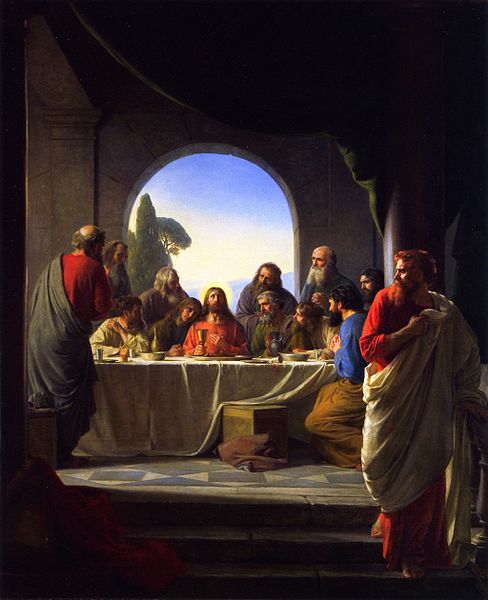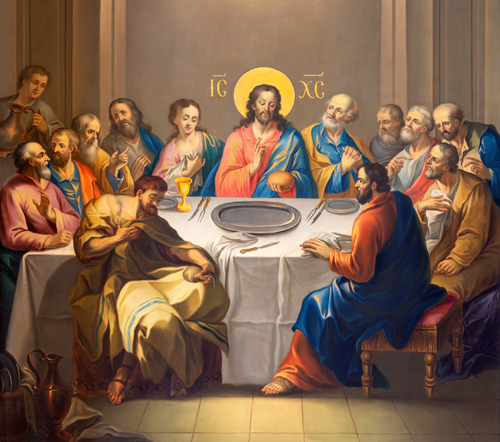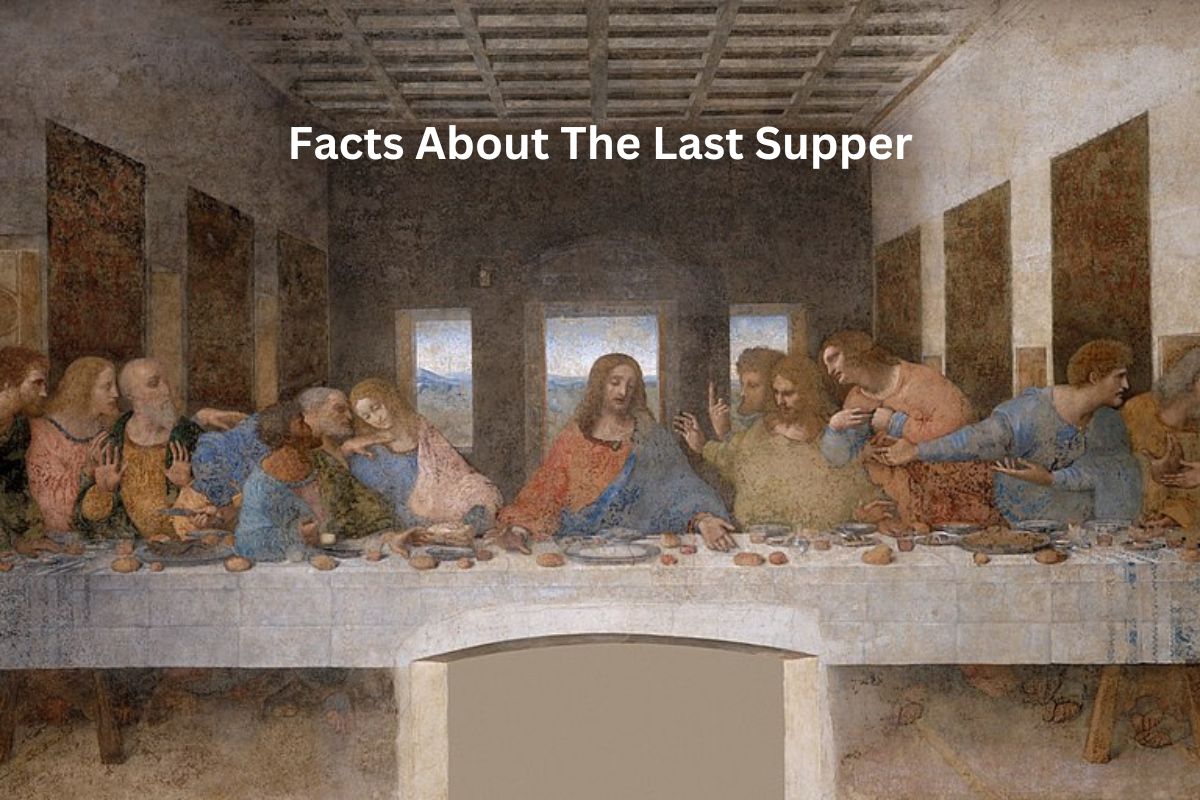The Last Supper, a pivotal event in Christian history, marks the final meal that Jesus shared with his disciples before his crucifixion.
Taking place during the Jewish festival of Passover in Jerusalem’s Upper Room, this gathering holds deep spiritual and symbolic significance.
During this meal, Jesus instituted the Eucharist, symbolizing his body and blood, and performed acts of humility, such as washing his disciples’ feet.
The Last Supper also included prophecies of Judas Iscariot’s betrayal and Peter’s denial, as well as important teachings and comfort from Jesus.
Today, it is commemorated through the Eucharist, serving as a central element of Christian worship and a reminder of Jesus’ sacrifice and teachings.
The Last Supper Facts
1. Occurred during Passover
The Last Supper took place during the Jewish festival of Passover, which is a highly significant and sacred holiday in Judaism. Passover commemorates the Israelites’ liberation from slavery in Egypt, as described in the Old Testament book of Exodus.
Also Read: Trials of Jesus Timeline
During Passover, Jewish families gather for a special meal called the Seder, which includes various symbolic foods and rituals.
In the case of The Last Supper, Jesus and his disciples were celebrating Passover, making the event even more meaningful in the context of the New Testament.

2. Took place in Jerusalem’s Upper Room
The exact location of The Last Supper has been a subject of debate among scholars, but it is traditionally believed to have occurred in a room in Jerusalem often referred to as the “Upper Room” or the “Cenacle.”
Also Read: Crucifixion Facts
This room is associated with the place where Jesus and his disciples gathered to share the meal. It is significant as the setting for the institution of the Eucharist and for Jesus’ washing of his disciples’ feet. Many Christian pilgrims visit Jerusalem to see sites associated with The Last Supper.
3. Jesus shared it with his 12 disciples
The Last Supper was an intimate gathering where Jesus shared the meal with his twelve closest disciples, who are often referred to as the “apostles.”
These twelve disciples played a central role in Jesus’ ministry and became the foundation of the early Christian Church. They were named as follows:
- Simon Peter
- James (son of Zebedee)
- John (son of Zebedee)
- Andrew
- Philip
- Bartholomew (or Nathanael)
- Matthew (or Levi)
- Thomas (also known as Doubting Thomas)
- James (son of Alphaeus)
- Thaddaeus (also known as Lebbaeus or Judas, son of James)
- Simon the Zealot
- Judas Iscariot (who would later betray Jesus)
The Last Supper was a significant moment in the lives of these disciples, as it marked the institution of the Eucharist and included important teachings and predictions by Jesus, setting the stage for the events that would follow, including his arrest, crucifixion, and resurrection.
4. Bread and wine symbolized Jesus’ body and blood
During The Last Supper, Jesus took bread, blessed it, and broke it, giving it to his disciples, saying, “Take, eat; this is my body.”
He also took a cup of wine, blessed it, and gave it to them, saying, “Drink from it, all of you; for this is my blood of the covenant, which is poured out for many for the forgiveness of sins” (Matthew 26:26-28).
This act is considered by Christians to be the institution of the Eucharist, also known as Holy Communion. In this sacrament, bread and wine symbolize the body and blood of Jesus Christ, and participating in the Eucharist is a central aspect of Christian worship.
5. Institution of the Eucharist/Holy Communion
The words and actions of Jesus during The Last Supper are seen as the institution of the Eucharist or Holy Communion in Christian theology.
This sacrament varies in practice among different Christian denominations, but it generally involves the consecration of bread and wine, which are believed to become, in a spiritual sense, the body and blood of Christ.
By partaking in the Eucharist, Christians symbolically share in the sacrifice of Jesus and are reminded of his redemptive work on the cross. It is considered one of the holiest and most central rituals in Christianity.

6. Jesus washed his disciples’ feet
Before the meal at The Last Supper, Jesus performed an act of humility and servitude by washing his disciples’ feet. This action is recorded in the Gospel of John (John 13:1-17). By washing their feet, Jesus demonstrated the importance of humility, love, and service in the Christian life.
He used this act as a teaching moment, explaining that his disciples should follow his example of serving one another. This act of footwashing is sometimes reenacted in Christian churches as a symbol of humble service and a reminder of Jesus’ teachings on servant leadership.
7. Judas Iscariot’s betrayal
During The Last Supper, Jesus revealed to his disciples that one of them would betray him. Judas Iscariot, one of the twelve disciples, asked Jesus if it was him, and Jesus confirmed that it was.
This revelation foreshadowed Judas’ later actions when he would betray Jesus to the religious authorities for thirty pieces of silver. Judas’ betrayal ultimately led to Jesus’ arrest, trial, and crucifixion.
8. Peter’s predicted denial
At The Last Supper, Jesus also predicted that Peter, one of his most prominent disciples and a close friend, would deny knowing him three times before the rooster crowed. This prophecy troubled Peter, but it later came to pass just as Jesus had foretold.
Peter denied Jesus out of fear during the events leading up to Jesus’ crucifixion, but he later expressed deep remorse and went on to become a key figure in the early Christian Church.

9. Jesus gave important teachings and comfort
The Last Supper was a significant moment for Jesus to provide his disciples with important teachings and words of comfort. In the Gospel of John (chapters 14-16), Jesus delivered what is often referred to as the Farewell Discourse.
He spoke about the coming of the Holy Spirit, who would guide and empower his followers after his departure. Jesus also emphasized the importance of love, unity, and abiding in him as branches abide in the vine.
10. Commemorated through the Eucharist in Christianity
The Last Supper holds immense significance in Christian tradition and worship. It is commemorated through the Eucharist, also known as Holy Communion or the Lord’s Supper, which is central to Christian liturgy and practice in many denominations.
During the Eucharist, Christians partake in consecrated bread and wine, symbolizing the body and blood of Christ, as a way to remember and spiritually participate in Jesus’ sacrifice on the cross.
This act of remembrance serves as a central element of Christian worship, reinforcing the foundational beliefs of salvation, forgiveness of sins, and the ongoing presence of Christ in the lives of believers.
